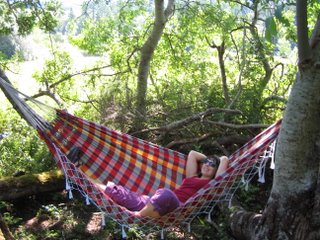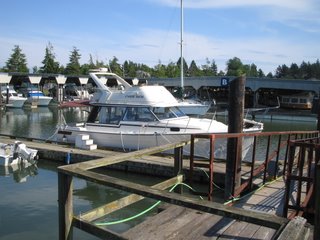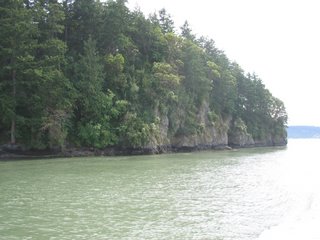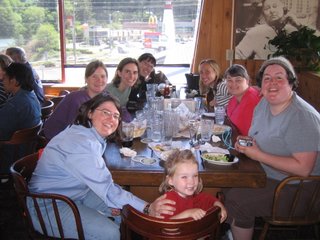I’m done. Today was supposed to be a long day—my last long day of cancer treatment. I was supposed to be at the clinic from, essentially, 10:30 am to 7:00 pm (with a lunch break, of course). I’ve been going to the clinic for five years now; every week for the first six months, and every three weeks for the past 4 ½ years. That’s a long time. In fact, it’s a longer amount of time than Ian and I have been married. It’s more time than Spackle, our dog, has been alive. It’s more time than I spent in college, almost (but not quite) counting my MA. It’s half a decade. I’ve been in treatment in two decades in my life—my twenties and my thirties. In fact, if you count my first round of cancer treatments, which, to my utter disbelief and bafflement, started in 1999 when I was twenty-six, well then, my time in treatment has spanned two millennia.
And now it’s done. After a fitful night of sleep, I awoke this morning, attempted (badly) the Thursday New York Times crossword puzzle, and then restlessly roamed the house waiting for 10:10 when I could leave to get to my blood drawn. Ian came in at one point and suggested something, I don’t know what, and I lashed out at him, tears in my eyes. “I’m going to be a little snappy today,” I told him unnecessarily.
At 10:30 at the clinic I had an IV poked into my left forearm and blood drawn. An hour later, after Ian had met me in a waiting room, and we’d sat around well, waiting, me with my heart in my throat, the proverbial weight on my chest, making it hard to breathe normally so that I occasionally took a giant conscious breath, I finally got in for my chest CT. As soon as I was done, we rushed off, ignoring the request that I stay around 10 minutes in case I developed a reaction to the radioactive iodine. Well, I had developed a reaction, and it told me to get the hell out of that clinic, at least for a while.
I felt like a bug put in a jar by a benevolent but clueless giant. There were airholes, but all around me I was bumping against invisible barriers between me and the life I wanted to lead, and I’d been in the jar for five years. For the last several weeks my feelings have been an exhausting mixture of euphoria and dread—when I reached the 22nd of June, I’d be set free! But what if that killed me? What if I couldn’t go it alone? But what if I didn’t have the chance to be set free, anyway? Maybe the cancer had come back in the last few months since my last meeting with the doctor. But maybe I’d just be free—free to travel when I wanted to, instead of planning out, months in advance, trips that would fit within my three week grid. Free to rock climb any day I wanted, instead of having to wait 4 days after every infusion until my body expelled the extra saline and my fingers returned to normal size, and didn’t feel like popping when I hauled myself up walls. Free to feel like any other healthy 33-year-old.
At 1:00 pm, Dr Livingston would let me know.
We had an hour to kill, so Ian and I went to lunch, meeting Mom, at a lovely Italian place called Serafina, 3 minutes from the clinic. I think I behaved moderately respectably; I hadn’t been able to eat anything in the morning, but I knew my tenuous hold on my composure would become nonexistent if I met the doctor on an entirely empty stomach, no matter what the news. So I ate, excellent bread and olive oil and salt, ravioli with ricotta and pine nuts, a cup of decaf. A salad. I think my table manners were passable; it’s a nice restaurant and our server (who, albeit, had dreadlocks) never looked at me askance. I probably behaved okay, although I felt, dimly, that I was stuffing bread into my mouth as if I hadn’t had a meal in days.
And then it was time to go, and within minutes we were at the clinic, then I was getting weighed (even in the throws of almost blinding anxiety I was able to joke about taking off my flip flops because they’d add so many significant ounces to the never acceptable total), then they took my blood pressure, my temperature, checked my pulse, and suddenly the doctor was there.
“You look fine,” he said. “Your CT is normal.”
And I burst into tears.
He comforted me, then left while I got undressed for the physical part of the exam; when that was done, we sat around and talked. About birth control (not the Pill; barrier methods). About nutrition (“Your brain needs sugar. Your heart needs sugar.”). About alcohol (“There seems to be legitimate evidence supporting the use of alcohol for heart health”). About the fact that Dr Livingston is leaving, moving to Tucson in August (“You stayed around just long enough to make sure I’d be alright, right?” “Of course I did,” smiling at me).
Finally, he stood up. “Are you accessed?” he asked, wondering if I had an IV in my port.
“No, I’m not,” I said.
“Well, then, you’re free to go home!”
I stared blankly for a minute. “Um . . . I’m not going to get the last infusion?”
“Well, why bother?” he asked. “Of course, you can always go up and say goodbye to the nurses. I’ll send someone up to tell them you won’t be having your infusion.” Then, smiling, he gave me a big hug.
A little dazed, Ian and I made our way up to the fifth floor, where my nurse for the day, who had given me the IV and blood draw in the morning and had waited for hours to give me my last infusion, insisted on flushing my port anyway (I’m going to keep it for the time being; and it needs to be flushed every 4 weeks—but that’s flexible!—to make sure blood clots don’t form), and when she was done and we pulled back our curtain, a choir of nurses flung a pink and silver feather boa around my neck and sang a “You’ve finished chemo!” song that someone wrote. Ian teared up, and I teared up, and then they took pictures of us, and then the song finished and everyone cheered, including the lady in the infusion chair next to me.
And I hugged everyone and walked out with Ian, feeling much the way I did upon arrival in SeaTac last December after the ten hours of trans-Pacific turbulence hell, namely, a sort of grateful—and yes, euphoric—disbelief that I am still alive.
I’m very much looking forward to living the rest of my life outside the jar.
 I climbed into the hammock, lay back, and felt myself—body, mind and soul—ease into bliss, a fear-free bliss I hadn’t felt in a long time. Fresh green leaves trembled in the breeze above my head, irregularly framing a cerulean sky. The temperature was perfect—not a hint of hot nor cold. The hammock, a brightly-colored, tightly-woven one Ian had brought from Brazil three years ago, supported my body completely and gently—no rope mesh digging into my tender flesh. I lay there in a pool of shade in a lambent afternoon, surrounded by love, surrounded by peace, surrounded by quiet land and birdsong, in a bit of nature that I have somehow had the extraordinary good fortune to call my own.
I climbed into the hammock, lay back, and felt myself—body, mind and soul—ease into bliss, a fear-free bliss I hadn’t felt in a long time. Fresh green leaves trembled in the breeze above my head, irregularly framing a cerulean sky. The temperature was perfect—not a hint of hot nor cold. The hammock, a brightly-colored, tightly-woven one Ian had brought from Brazil three years ago, supported my body completely and gently—no rope mesh digging into my tender flesh. I lay there in a pool of shade in a lambent afternoon, surrounded by love, surrounded by peace, surrounded by quiet land and birdsong, in a bit of nature that I have somehow had the extraordinary good fortune to call my own. 


